英国社会与文化
英语国家社会与文化重点术语

英语国家社会与文化重点术语1. British Monarchy:英国君主制,指的是英国的君主制政府体制。
2. House of Commons:下议院,指的是英国主要立法机关之一,也是英国议会的两个部分之一。
3. House of Lords:上议院,指的是英国另外一个主要立法机关,也是英国议会的两个部分之一。
4. Prime Minister:首相,指的是英国执政党领导人,是英国内阁的首脑和政府的领导者。
5. Cabinet:内阁,指的是由首相挑选的政府部长组成的政府机构,决定英国政府的政策和行动。
6. Queen’s Speech:女王演讲,每年在英国的议会开幕时,由女王亲自发表的演讲。
7. Politics:政治,指的是社会维护社会稳定,调节社会关系,实现社会发展的活动过程。
8. Parliament:英国议会,是讨论和决定英国国家政策的高级立法机构,也是英国政府的最高权力机构。
9. Law:法律,规范国家内外秩序、保障国家和民族利益和权利的检测过程。
10. Constitution:宪法,是一国的政权体系以及公民权利和义务的根本法。
11. Human Rights:人权,指人们在代表国家的政府的保护下,享有的一系列的权利和自由。
12. Freedom of Expression:言论自由,指人民可以自由地表达自己的想法,不受任何形式压制。
13. National Identity:国家认同,指共同体中具有特定文化、语言、信仰等共同性的独特性,共同为国家特定历史、凝聚力和竞争力而努力。
14. Diversity:多样性,指的是不同文化、不同宗教、不同背景和不同选择等等,都在一起被尊重、受到容纳、并互相影响。
15. Multiculturalism:多元文化,指的是一个社会中的多种文化,有存在的多样性的社会。
16. Immigration:移民,指的是一个国家的人口在短时间内有显著的增长,或者将永久定居于其他国家的行为。
现代英国政治和社会文化的发展和变化

现代英国政治和社会文化的发展和变化从文艺复兴到现代化的英国政治和社会文化英国一度是一个东西方文化的交汇点。
在文艺复兴时期的英国,意大利文化、法国文化乃至于原始的英格兰文化混杂在一起,产生了一段奇妙的历史。
英国政治历经几百年的演变,英国的政治逐渐走向了现代化。
这一进程可以追溯到17世纪,“国王与议会”的冲突斗争上。
此后,英国国家层面上的权力和国会不断膨胀,国王的权力被削弱,并最终完全失去了权力。
18世纪英国工业革命的发展也为英国的政治创造了条件。
工业能源、金融资本的发展让英国的经济更加强大,而这种强大又反过来促进了英国政治变革的进程。
在这个过程中,英国经历了两次重要的政治变革:1832年和1884年议会法案。
1832年议会法案标志着英国从古老的绅士统治向民权改革的转变。
此外,伊丽莎白时代的女性亦在1780至1870年间逐渐普遍获得签署和执行遗嘱的权利、否决自己的丈夫决定易女权力和获得婚姻财产的所有权。
1884年议会法案为“大多数人”的选举产生开启,非富裕劳动阶层终于有了选举权,成为真正意义上的选民。
当时的英国政治环境相对平稳,但开始了大量的扩建活动以应对日益增长的人口规模。
二十世纪的英国政治变革由战争的影响和工党名称高峰之一的1945年大选引领。
该次选举标志着英国战后的重建和福利国家的奠基,这为未来的英国政治供给了一个新的范例和道路选择。
从那时起,英国工党和保守党轮流领导着国家,推动各种社会和政治改革,尤其是在普及健康保险、建立国民医疗体系和实行反对歧视的平等法律等方面迈出了关键性的步伐。
当代英国政治的发展和变化今天的英国政治已经进入了数字时代,一些新兴事物和新的政治问题也逐渐出现。
国内政治稳定,外交势头强劲砸外界注意到的是英国脱欧的影响。
尽管脱欧已经完成了,但它带来的社会变化还正在发生中。
脱欧后的英国经济并没有像人们预计的那样出现崩溃的局面,相反,它似乎已经得到了稳步发展。
但是,英国脱欧可能会对英国的社会地位产生重大影响。
英国文化与社会的转型
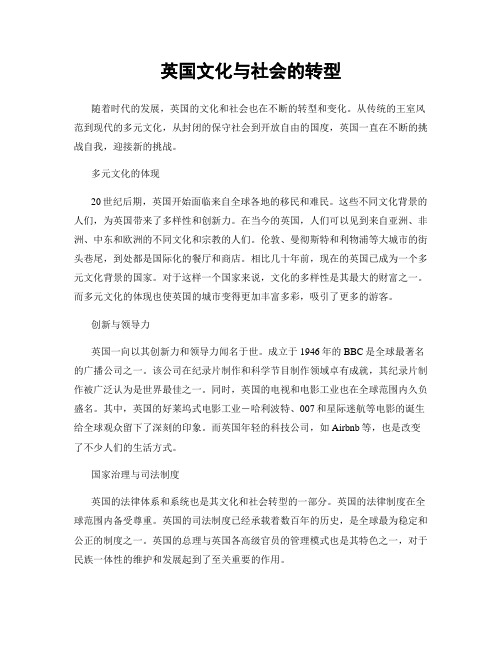
英国文化与社会的转型随着时代的发展,英国的文化和社会也在不断的转型和变化。
从传统的王室风范到现代的多元文化,从封闭的保守社会到开放自由的国度,英国一直在不断的挑战自我,迎接新的挑战。
多元文化的体现20世纪后期,英国开始面临来自全球各地的移民和难民。
这些不同文化背景的人们,为英国带来了多样性和创新力。
在当今的英国,人们可以见到来自亚洲、非洲、中东和欧洲的不同文化和宗教的人们。
伦敦、曼彻斯特和利物浦等大城市的街头巷尾,到处都是国际化的餐厅和商店。
相比几十年前,现在的英国已成为一个多元文化背景的国家。
对于这样一个国家来说,文化的多样性是其最大的财富之一。
而多元文化的体现也使英国的城市变得更加丰富多彩,吸引了更多的游客。
创新与领导力英国一向以其创新力和领导力闻名于世。
成立于1946年的BBC是全球最著名的广播公司之一。
该公司在纪录片制作和科学节目制作领域卓有成就,其纪录片制作被广泛认为是世界最佳之一。
同时,英国的电视和电影工业也在全球范围内久负盛名。
其中,英国的好莱坞式电影工业-哈利波特、007和星际迷航等电影的诞生给全球观众留下了深刻的印象。
而英国年轻的科技公司,如Airbnb等,也是改变了不少人们的生活方式。
国家治理与司法制度英国的法律体系和系统也是其文化和社会转型的一部分。
英国的法律制度在全球范围内备受尊重。
英国的司法制度已经承载着数百年的历史,是全球最为稳定和公正的制度之一。
英国的总理与英国各高级官员的管理模式也是其特色之一,对于民族一体性的维护和发展起到了至关重要的作用。
总之,英国的文化和社会正在不断转型。
从多元文化的体现到创新和领导力,再从国家治理到司法制度,英国人在不断的尝试和探索中不断前进。
英国的文化和社会面临的挑战也越来越多,但是只要英国人民齐心协力,相信他们一定能够化解现在和未来的任何困难和挑战。
英国文艺复兴时期的文化传统与社会风尚
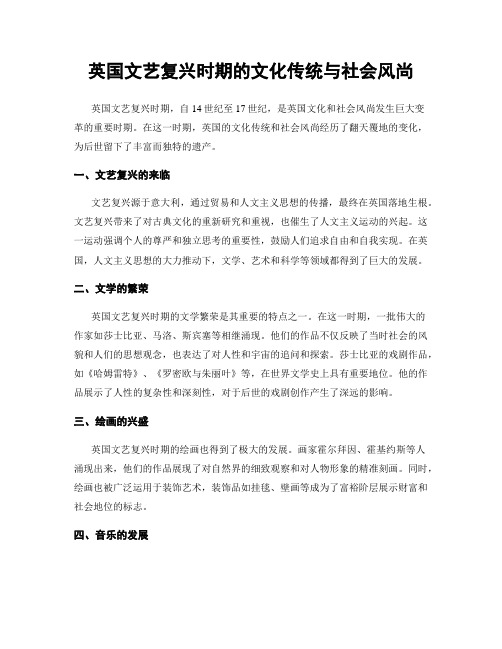
英国文艺复兴时期的文化传统与社会风尚英国文艺复兴时期,自14世纪至17世纪,是英国文化和社会风尚发生巨大变革的重要时期。
在这一时期,英国的文化传统和社会风尚经历了翻天覆地的变化,为后世留下了丰富而独特的遗产。
一、文艺复兴的来临文艺复兴源于意大利,通过贸易和人文主义思想的传播,最终在英国落地生根。
文艺复兴带来了对古典文化的重新研究和重视,也催生了人文主义运动的兴起。
这一运动强调个人的尊严和独立思考的重要性,鼓励人们追求自由和自我实现。
在英国,人文主义思想的大力推动下,文学、艺术和科学等领域都得到了巨大的发展。
二、文学的繁荣英国文艺复兴时期的文学繁荣是其重要的特点之一。
在这一时期,一批伟大的作家如莎士比亚、马洛、斯宾塞等相继涌现。
他们的作品不仅反映了当时社会的风貌和人们的思想观念,也表达了对人性和宇宙的追问和探索。
莎士比亚的戏剧作品,如《哈姆雷特》、《罗密欧与朱丽叶》等,在世界文学史上具有重要地位。
他的作品展示了人性的复杂性和深刻性,对于后世的戏剧创作产生了深远的影响。
三、绘画的兴盛英国文艺复兴时期的绘画也得到了极大的发展。
画家霍尔拜因、霍基约斯等人涌现出来,他们的作品展现了对自然界的细致观察和对人物形象的精准刻画。
同时,绘画也被广泛运用于装饰艺术,装饰品如挂毯、壁画等成为了富裕阶层展示财富和社会地位的标志。
四、音乐的发展英国文艺复兴时期的音乐也达到了较高的水平。
宗教音乐、合唱和器乐等形式得到了广泛的发展和应用。
作曲家托马斯·塔勒斯等人以其杰出的作品享誉世界。
他们的作品充满了对宗教信仰和精神性的追求,给人以心灵的震撼和启迪。
五、社会的变革英国文艺复兴时期的社会也发生了翻天覆地的变化。
随着商业和工业的发展,英国社会逐渐从封建社会向资本主义社会转变,贵族和新兴资产阶级逐渐崛起。
文艺复兴时期的英国成为一个注重商业活动和个人权利的社会,人们开始追求物质享受和自我实现。
六、教育的进步英国文艺复兴时期的教育也得到了长足的进步。
19世纪英国社会与文化浅析
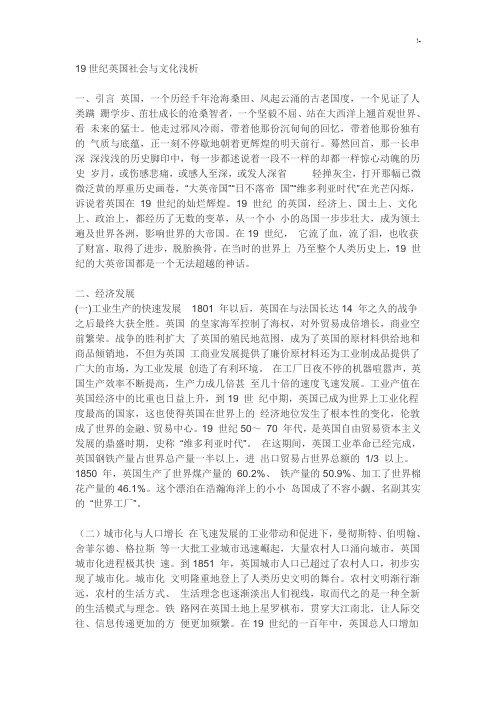
19世纪英国社会与文化浅析一、引言英国,一个历经千年沧海桑田、风起云涌的古老国度,一个见证了人类蹒跚学步、茁壮成长的沧桑智者,一个坚毅不屈、站在大西洋上翘首观世界、看未来的猛士。
他走过邪风冷雨,带着他那份沉甸甸的回忆,带着他那份独有的气质与底蕴,正一刻不停歇地朝着更辉煌的明天前行。
蓦然回首,那一长串深深浅浅的历史脚印中,每一步都述说着一段不一样的却都一样惊心动魄的历史岁月,或伤感悲痛,或感人至深,或发人深省······轻掸灰尘,打开那幅已微微泛黄的厚重历史画卷,“大英帝国”“日不落帝国”“维多利亚时代”在光芒闪烁,诉说着英国在19 世纪的灿烂辉煌。
19 世纪的英国,经济上、国土上、文化上、政治上,都经历了无数的变革,从一个小小的岛国一步步壮大,成为领土遍及世界各洲,影响世界的大帝国。
在19 世纪,它流了血,流了泪,也收获了财富,取得了进步,脱胎换骨。
在当时的世界上乃至整个人类历史上,19 世纪的大英帝国都是一个无法超越的神话。
二、经济发展(一)工业生产的快速发展1801 年以后,英国在与法国长达14 年之久的战争之后最终大获全胜。
英国的皇家海军控制了海权,对外贸易成倍增长,商业空前繁荣。
战争的胜利扩大了英国的殖民地范围,成为了英国的原材料供给地和商品倾销地,不但为英国工商业发展提供了廉价原材料还为工业制成品提供了广大的市场,为工业发展创造了有利环境。
在工厂日夜不停的机器喧嚣声,英国生产效率不断提高,生产力成几倍甚至几十倍的速度飞速发展。
工业产值在英国经济中的比重也日益上升,到19 世纪中期,英国已成为世界上工业化程度最高的国家,这也使得英国在世界上的经济地位发生了根本性的变化,伦敦成了世界的金融、贸易中心。
19 世纪50~70 年代,是英国自由贸易资本主义发展的鼎盛时期,史称“维多利亚时代”。
在这期间,英国工业革命已经完成,英国钢铁产量占世界总产量一半以上,进出口贸易占世界总额的1/3 以上。
维多利亚时期英国文化与社会变革的关系研究
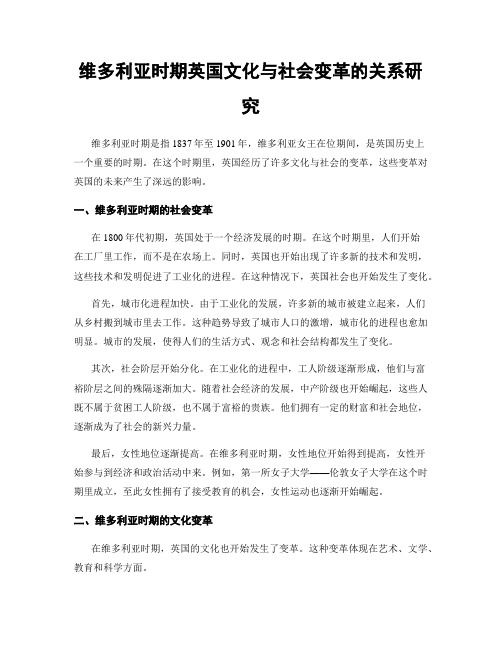
维多利亚时期英国文化与社会变革的关系研究维多利亚时期是指1837年至1901年,维多利亚女王在位期间,是英国历史上一个重要的时期。
在这个时期里,英国经历了许多文化与社会的变革,这些变革对英国的未来产生了深远的影响。
一、维多利亚时期的社会变革在1800年代初期,英国处于一个经济发展的时期。
在这个时期里,人们开始在工厂里工作,而不是在农场上。
同时,英国也开始出现了许多新的技术和发明,这些技术和发明促进了工业化的进程。
在这种情况下,英国社会也开始发生了变化。
首先,城市化进程加快。
由于工业化的发展,许多新的城市被建立起来,人们从乡村搬到城市里去工作。
这种趋势导致了城市人口的激增,城市化的进程也愈加明显。
城市的发展,使得人们的生活方式、观念和社会结构都发生了变化。
其次,社会阶层开始分化。
在工业化的进程中,工人阶级逐渐形成,他们与富裕阶层之间的殊隔逐渐加大。
随着社会经济的发展,中产阶级也开始崛起,这些人既不属于贫困工人阶级,也不属于富裕的贵族。
他们拥有一定的财富和社会地位,逐渐成为了社会的新兴力量。
最后,女性地位逐渐提高。
在维多利亚时期,女性地位开始得到提高,女性开始参与到经济和政治活动中来。
例如,第一所女子大学——伦敦女子大学在这个时期里成立,至此女性拥有了接受教育的机会,女性运动也逐渐开始崛起。
二、维多利亚时期的文化变革在维多利亚时期,英国的文化也开始发生了变革。
这种变革体现在艺术、文学、教育和科学方面。
首先,文艺复兴运动开始兴起。
在这个时期中,人们开始重新审视古典文化和艺术,重新评估原有观念和价值。
这种运动促进了英国文化的发展,也对欧洲文化产生了深远影响。
其次,文学开始兴起。
在维多利亚时期,英国文学进入了一个新的阶段。
许多著名的作家如狄更斯、莎士比亚、托马斯·哈代等人的著作在这个时期里问世。
这些作家的作品反映了当时社会变革的方方面面,具有了深刻的社会批判意义。
最后,教育和科学的发展推动了文化变革的进程。
英语国家概况 第8章 英国社会与文化
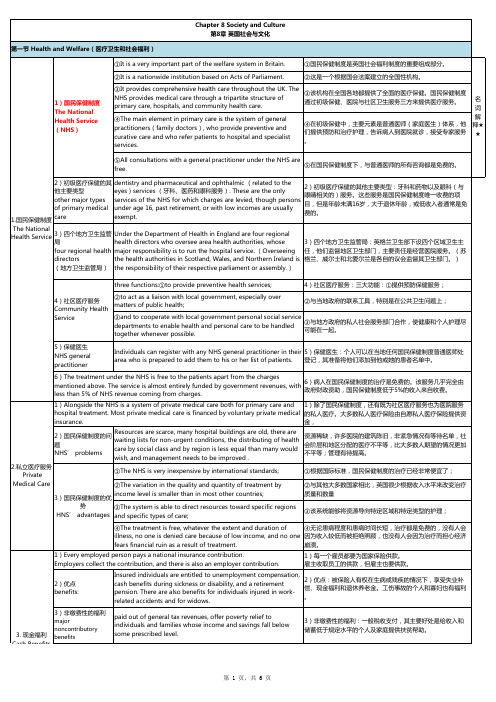
Cash Benefits5)改革reformsIn the late 1990s a working-families tax credit(税务减免)replaced income support for low-paid working households with children; the government introduced a national minimum wage;the government also introduced a children’s tax credit toprovide additional support to low-and middle-income families.5)改革:在20世纪90年代后期,提出工薪家庭税收减免政策,来取代对低收入家庭孩子的收入支持,政府还出台了国家最低工资标准。
政府还出台了一个儿童税收减免,以向中低收入家庭提供更多的支持。
在20世纪中期1)在20世纪中期,英国地方政府营造了简易住宅(包括公共房产)1980年2)1980年“购买权”法律的出现,很多租户变成了业主居住者。
21世纪开端3)21世纪开端,当地政府对房屋的占有率几乎减半。
1)教育国务大臣全面负责英格兰的教育,并对议会、教育部和科学部负责2)在苏格兰、威尔士和北爱尔兰,教育部门由部长领导,并对区议会负责。
初、中级教育是地方政府的责任。
地方教育机构雇佣教师,并提供教育经费。
少数的学校由自愿者经营,多具备宗教性质。
也有一小部分是私营的。
3)初级教育是免费的,从5岁到11岁是义务教育。
地方教育机构通过各种组织形式,为11到19岁的孩子提供中等教育,中等教育是免费的,义务教育到16岁。
1)除了公立学校,一小部分私立学校(常被称为“公学”)为1到20岁的孩子提供教育。
2)在英国,那些私立学校常被称为“公学”。
3)这些学校的教育资金来源于学费和私人募捐。
4)其中的大部分学生来自富裕家庭,并非常愿意继续到名牌大学深造。
英国社会与文化_英国教育制度

英国社会与文化_英国教育制度
英国社会和文化的特征受英国宪法法律和经济状况的影响,它将文化和英国基础教育制度作为一种社会结构的基础。
英国的教育制度基于技术和职业技能、语言、历史和文化的研究,以及培养学生及其他人的思维和感情能力。
这也是英国人习惯于以自身文化和习俗为基础的原因之一英国教育系统的基本框架是模仿爱德华八世的家庭兴建的,他即使大多数英国家庭的教育制度,将英国排在欧洲良知。
在英国,教育分为三个层次:小学、中学和大学。
小学教育通常包括四个阶段,分别是幼儿园(4-5岁)、小学(5-11岁)、初中(11-14岁)和高中(14-16岁)。
学生根据自己的实力进行分班,也可以选择辅导课程。
小学教育的重点是基础理论和实践技能的锻炼,以便培养孩子的理解能力和解决问题的技能。
从国家制定的标准材料上看,中学教育的目的是为学生们的将来成功建桥梁,使他们能够发挥最大的潜能,以实现充分发展。
中学教育主要以提高学生综合素养、统筹能力、社会责任感和社会文化的能力为目标,并培养学生全面发展的技能与素养。
大学教育提供了更多的可能性,使学生能够深入探索他们的兴趣,以适应不断变化的世界。
- 1、下载文档前请自行甄别文档内容的完整性,平台不提供额外的编辑、内容补充、找答案等附加服务。
- 2、"仅部分预览"的文档,不可在线预览部分如存在完整性等问题,可反馈申请退款(可完整预览的文档不适用该条件!)。
- 3、如文档侵犯您的权益,请联系客服反馈,我们会尽快为您处理(人工客服工作时间:9:00-18:30)。
英国社会与文化 An Introduction to British Society & Culture主编常俊跃 李莉莉 赵永青国家哲学社会科学项目“英语专业基础阶段内容依托式教学改革研究”项目组 编ContentsUnit 1 The English Character (1)Text A The English Character (I) (1)Text B The English Character (II) (7)Text C The English Spirit of Control (11)Unit 2 The Constitutional Monarchy (14)Text A The Constitutional Monarchy (15)Text B The Role of the Monarchy Today (23)Text C The Queen’ s Official Birthday (25)Text D Diana, the People’s Princess (27)Unit 3 The British Parliament (33)Text A The British Government Today (34)Text B Political Parties in the U.K (39)Text C Margaret Thatcher (41)Unit 4 Food and Drinks in the U.K (45)Text A Food and Drinks in the U.K (46)Text B British Meals (51)Text C Pub Etiquette (53)Text D Leisure Time for Britons (56)Unit 5 The British Ways & Manners (60)Text A Politeness in Britain (61)Text B What’s Typically British (66)Text C Social Customs in Britain (68)Text D Name Roots (71)Unit 6 Education System in the U.K (74)Text A Going to School: British Style (75)Text B Schools in the U.K (79)Text C Boarding School (81)Unit 7 The British Welfare System (85)Text A Welfare System in the U.K (86)Text B The Welfare State (90)Text C The National Health Service (92)Unit 8 The British Media (94)Text A The British Press (95)Text B The Broadcast Media (100)Text C Local Newspapers in Britain (102)Text B Jury System in the Dock (113)Text C The Police in Britain (115)Unit 10 Family Life in the U.K (118)Text A Family Life in the U.K (119)Text B Changing Values & Norms of the U.K. Family (124)Text D Marriage Customs (127)Unit 11 The British Sports & Games (129)Text A The British Sports (130)Text B Cricket—A Very English Game (136)Text C The Highland Games (137)Text D Traditional Games in Scotland (139)Unit 12 Theatre & Music in the U.K (142)Text A Theatre & Music in the U.K (143)Text B Pantomimes (150)Text C Cats, the Classic Musical (151)Text D The Beatles (152)Unit 13 The British Holidays& Festivals (156)Text A Holidays and Festivals in the U.K (157)Text B Holiday Life in England (164)Text C Valentine Customs (166)Unit 14 The British Literature (I) (168)Text A Overview of British Literature (I) (169)Text B William Shakespeare (176)Text C To be, or not to be (177)Text D Of Studies (179)Unit 15 The British Literature (II) (182)Text A Overview of British Literature (II) (183)Text B Pride and Prejudice (191)Text C Christmas Dinner (193)Text D Agatha Christie––Queen of Crime (196)Appendix: Key to the Exercises (200)重点参考的书目和网站 (214)Unit 1The English CharacterSuccess is the ability to go from one failure toanother with no loss of enthusiasm.——Winston ChurchillUnit Goalsz To understand character and personality of English people e To understand character and personality of English peopl z To get acquainted with some basic cultural concepts concerning English characterTo get acquainted with some basic cultural concepts concerning English character z To learn some useful words and expressions on English character To learn some useful words and expressions on English characterBefore You ReadWork with your partner and share ideas with each other.1) What are the first three things that come into your mind when you hear the words “Britain” or “Britons”?E.g. When I think of “the English” I think of…____________________________________________________________________________________________________________________________________________2) What do you think of the Britons?What are the three descriptivewords you associate the most withthe British people?E.g. _____, _____, _____Start to ReadText A The English Character (I)1. To other Europeans, the best known quality of the British, and inhe never tells you anything about himself, and you may work with him for years without even knowing where he lives, how many children he has, and what his interests are. English people tend to be like that.2. If they are making a journey by bus they will do their best to findan empty seat; if by train, anempty compartment. If theyhave to share the compartmentwith a stranger, they may travelmany miles without starting aconversation. If a conversationdoes start, personal questions like“How old are you?” or even“What is your name?” are noteasily asked.3. This reluctance to communicate with others is an unfortunate quality in some ways since it tends to give the impression of coldness, and it is true that the English (except perhaps in the North) are not noted for their generosity and hospitality. On the other hand, they are perfectly human behind their barrier of reserve, and may be quite pleased when a friendly stranger or foreigner succeeds for a time in breaking the barrier down. We may also mention at this point that the people of the North and West, especially the Welsh, are much less reserved than those of the South and East.4. Closely related to English reserve is English modesty. Within their hearts, the English are perhaps no less conceited than anybody else, but in their relations with others they value at least a show of modesty. Self-praise is felt to be impolite. If a person is, let us say, very good at tennis and someone asks him if he is a good player, he will seldom reply “Yes,” because people will think him conceited. He will probably give an answer like, “I’m not bad,” or “I think I’m very good,” or “Well, I’m very keen on tennis.” Even if he had managed to reach the finals in last year’s local championships, he would say it in such a way as to suggest that it was only due to a piece of good luck.faults, one’s own failure, even atone’s own ideals. The criticism ,“He has no sense of humor” isvery commonly heard in Britain,where humor is highly prized. Asense of humor is an attitude tolife rather than the mere abilityto laugh at jokes. This attitude isnever cruel or disrespectful ormalicious . The English do not laugh at a cripple or a madman, or a tragedy or an honorable failure.6. Since reserve, a show of modesty and a sense of humor are part of his own nature, the typical Englishman tends to expect them in others. He secretly looks down on more excitable nations, and likes to think of himself as more reliable than they. He doesn’t trust big promises and open shows of feelings, especially if they are expressed in flowery language. He doesn’t trust self-praise of any kind. This applies not only to what other people may tell him about themselves orally, but to the letters they may write to him. To those who are fond of flowery expressions, the Englishman may appear uncomfortably cold.7. Finally, sportsmanship . Like a sense of humor, this is an Englishin ideal which not all Englishmen live upto. It must be realized that sport in thismodern form is almost entirely aBritish invention. Boxing, rugby,football, hockey, tennis and cricketwere all first organized and given rulesin Britain. Rules are the essence ofsport, and sportsmanship is the abilityto practice a sport according to its rules,while also showing generosity to one’sdefeat. The high pressure of modern international sport makes these ideals difficult to keep, but they are atleast highly valued in Britain and are certainly achieved there more commonly than among more excitable peoples. Moreover, sportsmanship as an ideal is applied to life in general this is proved by opponent and good temperwell-aimed, strong criticism and “below the belt” is used to describe an unfair one. One of the most elementary rules of life is “never hit a man when he’s down”—in other words, never take advantage of a person’s misfortune. English schoolboys often show this sense of sportsmanship to a surprisingly high degree in their relations with each other.After You ReadKnowledge Focuspartner and share ideas with each other.1. Work with your W h a t w o u l d a n E n g l i s h m a n o r w o m a n u s u a l l y d o i n t h e f o l l o w i n g s i t u a t i o n s ?lishman makes a journey to somewhere by train… man’s skills inomething quite funny happening in public and annis match…rite T if the statement is true and F if it is false.emotional, and____ 2) t noted for their generosity and____ 3) are much less reserved than people of the____ 4) is an attitude to life rather than the mere____ 5) lder” and “below the belt” areAn Eng An acquaintance asks an English lady’s age…Someone pays compliments to an English tennis…There’s s Englishman happens to see it…An Englishman has just lost a ten2. W ____ 1) A reserved person is one who is quite tends gets excited easily.The British people are no hospitality.The Welsh,South and East.A sense of humor ability to laugh at jokes.“Straight from the shou sporting terms borrowed from rugby.Language Focusnings of the bold-faced words in this text and 1. Discuss the mea work with a partner to fill in the blanks with a proper word ormunicate with others, he usuallye guests are treated _______.as honeyis likely to. Fill in the blanks with the following expressions you have be noted for look down on be keen on2) If a person is reluctant to com __________ to start a conversation.3) The hostess is very hospitable , and th 4) Whenever anyone mentions the word “conceit ”, the image of Mr.Darcy comes into mind, he was thought to be_________.5) You’d better ____________those people who are sweet to your face and as malicious as hell behind your back.6) If you seek help from a friend known for generosity , he __________.2learned in this text.due to for a time live up totake advantage of apply to) This rule cannot be ________ any case.to speak English.ilty, but before longlong. I ________ outdooress is entirely ________ his hard work.nts.. Fill in the blanks with the proper forms of words in the1) (reserve) person is one who does not talk very much tosh (except perhaps in the North) are not 12) Students must ________ every opportunity 3) Conceited people always ________ others.4) _________ the police thought she might be gu they eliminated her from their list of suspects.5) This resort ________ its hot springs.6) It’s boring to stay at home all day sports.7) His succ 8) I hope I can ________ the expectations of my pare3brackets.A _____ strangers, does not show much emotion, and seldom gets excited.2) This _____ (reluctant) to communicate with others is an unfortunate quality in some ways since it tends to give the impression of coldness.3) It is true that the Englivery _____ hoolboys often show this sense of sportsmanship to a6)The _____ (criticize), “He has no sense of humor” is commonly heard in Britain, where humor is highly prized. 7)The typical Englishman secretly looks down on more (excite) nations, and likes to think of himself as more _____ (rely) than they. 8) English sc _____ (surprise) high degree in their relations with each other.Comprehensive WorkBritish sayings and try to use them to make 1) time saves nine.an’s poison.not make it drink.em.th.. Pair-work: work with your partner and share ideas with each re the English character with the American character. What 1. Study the following dialogues.A stitch in 2) One man’s meat is another m 3) You can lead a horse to water, but you can 4) The grass is always greener on the other side.5) Don’t cross your bridges before you come to th 6) The best advice is found on the pillow.7) Birds of a feather flock together.8) Don’t look a gift horse in the mou2other.Compa are the similarities and differences?Read Moregolden ”, “Empty vessels make the most noise ” andeirtuations isnot exclusively a sporting one. It describes the sort ofay appear fearless and calm on the surface, deepmanner.2) “Silence is “You are not put on to this earth to enjoy yourself ”. From the sayings above we can get the clue that the English parents want their children to be __________________________________.3) If there is one trait that absolutely singles out the English it is th shared dislike for anyone or anything that “________”.4) To the English the proper way to behave in almost all si to display a languid _____ to almost everything. Even in affairs of the heart, it is considered unseemly to show one’s feelings except ________.5) The term is behaviour both on and off the playing field that characterises everything the English really respect. The term refers to “________”.6) Whilst they m down the English suffer from agonising self-doubt, feeling that in many areas of human activity they just cannot cut the mustard. The underlined expression means __________.7) The English have a strong sense of history and they tend to fillul and inventive, but rarelyText B The English Character (II)S t i f f U p p e rL i p their homes with ______.8) The English are endlessly resourcef ________ their inventions.teristic English pose involveskeep The charac ing the head held high, the upper lip stiffand the best foot forward. In this position,conversation is difficult and intimacy of any kindalmost impossible. This in itself is a clue to theEnglish character.ting rather like the thre nd behaviour against all c od is also Eng in this certainty to the gen vessels make the most noise” and, most telling, “You are not put on to this earth to enjoy yourself”.Small wonder that they end up, as adults, ac e wise monkeys and emotionally in traction.But still the English defend their character a omers. Perhaps that is because Puritanism with its punishing work ethic assures them that their reward for all that restraint will come at a sort of school prize-giving ceremony in the world to come.If it is the latter, they are forgetting that since G lish—a firmly-held belief—any hedonism in the next world will probably be accompanied by mugs of bromide.Nevertheless, the English continue to bask eral astonishment of the rest of mankind.is one trait that absolutely singles out the English it is their shar an excess of emo English the proper way to behave in almost all situations is to d If there ed dislike for anyone or anything that “goes too far”.Going too far, as the English see it, covers displaying tion, getting drunk, discussing money in public or cracking off-colour jokes and then laughing at them noisily. Beyond the pale altogether is the man or woman who regales one with his or her titles or qualifications. The only acceptable place to air these is on an envelope.To the isplay a languid indifference to almost everything, though one may be seething underneath. Even in affairs of the heart, it is considered unseemly to show one’s feelings except behind closed doors.h man or woman refers to you as “a good sport”, you wil sively a sporting one. It describes the sort of beh If an Englis l know that you have really arrived. For to them it is a qualification normally never awarded to a foreigner and by no means within the grasp of all the English.The term is not exclu aviour both on and off the playing field that characterises everything the English really respect. In all physical trials, the goodIt goes without saying that the good sport will also be a good loser. The English are fiercely com S e l re will be no arguing with umpires or outward signs of disappointment. On the contrary, a remark such as “The best man won!” tossed airily to all and sundry, and never through clenched teeth, is obligatory even in the face of crushing defeat.This does not really fool anyone, for the petitive especially in matters sporting. They would rather be crossed in love than beaten on the tennis courts, but to let it be seen would be going too far.f -D o u b tapparent colossal self-confidence and moral certainty of the conquered and foreigners to be e helter-skelter slide from Empire to Commonwealth and S e n It is the English that is paradoxically one of their greatest stumbling blocks. For both qualities are, to a certain extent, only illusions. Whilst they may appear fearless and calm on the surface, deep down the English suffer from agonising self-doubt, feeling that in many areas of human activity they just cannot cut the mustard.All the time there were countries to be governed, the English could sublimate all their clamouring uncertainty. The scent of success served as incense at the altar of their self-assurance.But with th ever downwards, their doubts, like itches, have begun to plague them and it is considered bad form to scratch in public.t i m e n tglish have a strong sense of history. Because their past was so led with old thingsnot The En infinitely more glamorous than their present, they cling to it tenaciously. Mix this love of bygone ages with an unrivalled sentimentality and you have a heady mixture which can be sensed inevery aspect of the English life.Antique shops clutter upevery town and village. Englishhomes are fil only because please the eyebut because there is a feeling thatShi andfather/grandmother, it’s good eno niness is vulgar and the patina of age lends respectability. Thus they cling on to old furniture, old carpets, old chipped china, old kitchen gadgets and garden implements long after common sense dictates that they should be replaced.“If it was good enough for my gr ugh for me!”. The English cry goes up and each new invasion from the future is greeted with the indignant question: “What was wrong with the old one?”. And as far as the English are concerned, there is no answer to that.InventivenessThe English are endlessly resourceful and inventive, but rarely pro one unobserved by gh, he will come up with something with real pro 2. Read the following passage and finish the following exercises.sunny in English comedy shows,to tea drinking in England: The water musttrol is shown infit from their inventions. The inventor in his garden shed turning out gadgets and widgets tends to be almost exclusively male, lacking the more practical female genes in any great numbers.Often perceiving needs in daily life which have g the rest of his compatriots, he will beaver away 24 hours a day creating such indispensable items as the perfect egg boiler or the self-creasing trouser.Occasionally, thou mise like the hovercraft which will then be ignored by his countrymen and taken up by foreigners.1) The English national character is dualistic: One aspect i conservative, the other _____.2) Most Americans find nothing f since English humor is _____ oriented while American humor is more _____ oriented.3) There is a whole ritual be _____ rapidly, the teapot _____, the tea _____, then _____ at least 5 minutes in a teapot covered by a tea cosy.4) In the following passage, the English spirit of con the following aspects: English pubs, ______, pace of living and ______.The English national character is dualistic: One aspect is conservative, the other extroverted. The English people, like people of elsewhere, love to entertain themselves in some pleasure; however, their pleasure always know temperance.The pub is a fine example of the conservative aspect of English character. The pub, unlike the bar in the U.S., is a focal point for the “locals.” One goes to the pub for the same reasons one used to go to church: for fellowship and spiritual enlightenment. There is nothing flashy or plastic about most pubs. Many look like one’s living room, full of plush, soft chairs, couches, a fireplace, and bright lights. The pubs keep respectable hours, too—open from 10 A.M. to 2 P.M. and 5 P.M. to 10 P.M.; Friday and Saturday nights they stay open until 11 P.M. There are no all-night or 3 A.M. public bars. When the pubs close everyone goes home. The pub represents pleasure with control and in good taste.This control is also exemplified in English humor. Most Americans find nothing funny in English comedy shows, since English humor is word oriented while American humor is more action oriented.The same control that is found in English pubs and humor is also found in the English pace of living. Where else does one stand in line quietly for the bus or the taxi?barbarians drink tea by placinga tea bag in a cup of hot water.There is a whole ritual to teadrinking in England: The watermust be boiling rapidly, theteapot warm, the tea loose, thensteeped at least 5 minutes in ateapot covered by a tea cosy.Then and only then does onepour the tea into a cup and drink it. Not only old ladies in lace with Pekingese on their laps drink tea, but a whole nation of workers, entrepreneurs, and aristocrats have tea for breakfast, lunch, and, of course, all activity stops in the afternoon for thecustomary tea break.NotesWinston Churchill (1874–1965) was a Britishpolitician known chiefly for his leadership of theUnited Kingdom during World War II. He served asPrime Minister of the United Kingdom from 1940 to from 1951 to 1955. A noted 1945 and again statesman and orator, Churchill was also an officer in the British Army, a historian, a Nobel Prize-winning writer, and an artist.For FunBooks to ReadJules Verne, Around the World in Eighty Days —Phileas Fogg bets half his fortune against other members of the Reform Club he can travel around the world in 80 days or less.Peter Mandler, The English National Character —a historian of modern Britain challenges long-held familiar stereotypes and proposes an entirely new perspective on what it means to think of oneself as being English.Movies to SeeMr. Bean—Life is a difficultchallenge for Mr. Bean, whohas trouble completing even thesimplest of tasks. Thankfully, his perseverance is usually rewarded, and he finds an ingenious way around the problem.。
